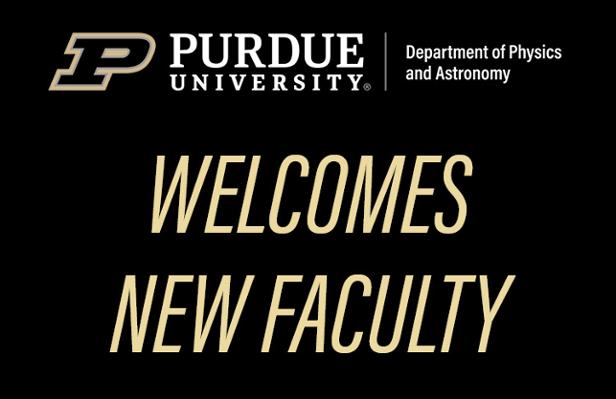
The Department of Physics and Astronomy at Purdue University welcomes new faculty
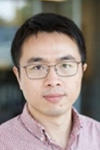
Dr. Jing Liu, Fall 2023
Liu's research focuses on the development of cutting-edge imaging methods and biophysical analysis tools to quantitatively interpret the complexity of molecules in a human cell. He was an assistant professor of Physics at the Indiana University - Purdue University Indianapolis (IUPUI).
"The utilization of physical sciences in cell biology is highly underestimated," says Liu. "Classical biology research is mostly based on the experimental observations; in the past decade, the newly emerged technologies and computational power have made the biological experiments quantitatively interpretable. I am especially interested in the spatiotemporal dynamics of the DNA and RNA that are the building blocks of life. Understanding these fundamental physical properties in the human cell will facilitate the diagnosis, treatment, and prevention of cancers, diabetes, and Alzheimer's Disease. My further research will integrate quantum optics techniques that would enable further advances in these fields."
Liu, an Associate Professor, will be teaching general physics, advanced laboratory, biophysics, and optics/advanced optics. While being at IUPUI, he has established his teaching philosophy by using the "Just In Time" method of teaching.
"I have integrated student active learning, group activities, and hands-on experience into my courses," explains Liu. "I intentionally create a collaborative learning environment, in which I act as a facilitator of learning and a resource to help in the students' own learning. Students are encouraged and expected to be actively involved in the learning process. In my classes, I have attempted to provide students with both theoretical perspectives and immediate practical applications necessary for their mastery of the course material. In addition, I also help students develop their presentation and writing skills through projects and presentations."
When not teaching or conducting research, Liu enjoys running. "I usually run 10k several times per week," he says. "This is the time that belongs to myself and I can focus on thinking about/brainstorming one specific thing over a long time."
Liu is no stranger to the West Lafayette campus; he received his Ph.D. at Purdue in 2015 in biological engineering from the Departments of Agriculture and Biological Engineering. Prior to this, he received his B.S. in physics at Nanjing University and his M.S. in optics at the Chinese Academy of Sciences (both located in China). After receiving his degree at Purdue, he immediately started an independent lab at the South Dakota School of Mines and Technology, then relocated to IUPUI in 2017. He is also affiliated with the Indiana University School of Medicine as a member of the Simon Comprehensive Cancer Center, Indiana Center of Diabetes and Metabolic Diseases, and Center for Computational Biology and Bioinformatics.
"The reason I chose to come to Purdue is the fantastic group of peers and excellent students in the physics department, College of Science, and across the entire west Lafayette campus," he says. "I appreciate the aggression on the research advances and emphasis on the engineering and physical science in biomedicine. At Purdue, I wish to establish a multidisciplinary biophysics program by connecting the strong physics and engineering research in West Lafayette with the unmet need in biomedicine in Indianapolis."
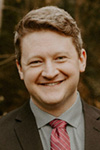
Dr. Ian Arnold, Fall 2023
The Department of Physics and Astronomy in the College of Science at Purdue University welcomes a new member to the faculty, Dr. Ian Arnold, Assistant Professor of Practice, effective August 14, 2023.
Prior to this appointment, Prof. Arnold held several teaching positions at the collegiate level, including Lecturer at Purdue University, adjunct faculty at Indiana University Purdue University Indianapolis, and adjunct faculty at Ivy Tech Community College.
Prof. Arnold has taught multiple subjects in physics and mathematics, including general physics, physics for life sciences, electric and magnetic interactions, optics lab, physical mechanics, general calculus, and multivariate calculus.
“It's really important to me as a physics teacher to make this great subject less scary for all students, especially those who are intimidated by its complexity,” says Arnold. “I am a physicist because I love exploring the structure and beautiful logic of the models that we use to describe nature. I also truly value the opportunity to communicate these ideas to the incredible students I get to teach here at Purdue.”
Prof. Arnold earned his doctorate from Purdue in 2019 in theoretical condensed matter physics and a master’s degree from Purdue in 2013 in experimental condensed matter physics. He graduated cum laude with a Bachelor of Arts degree in physics from Princeton University in 2011.
On his teaching career to date, Arnold noted, “I have called the Department of Physics and Astronomy my home for the last twelve years as a graduate student and lecturer, and I'm thrilled to be joining the amazing faculty who have taught me so much through the years!”
Part of Arnold’s teaching philosophy includes assisting students beyond the classroom. He notes, “Students come with varying levels of exposure to mathematical sciences and physics. My familiarity with both theoretical and experimental research also aids in conversations with students who are applying to graduate school in scientific research fields. I strive to make myself available to students to shore up understanding in the fundamentals needed to approach more complex topics. I also feel it is important to help students prepare for their pre-professional exams, including medical, dental, and optometry school admissions tests. I have frequently heard from students in person and in reviews that they were surprised to see how approachable physics can be, which is of paramount importance when working with such a technical subject.”
Prof. Arnold has been recognized with several awards during his career, including the 2023 Purdue College of Science service award, and the Purdue 2016 Akeley-Mandler Award for teaching excellence.
Prof. Arnold will teach multiple classes and administer learning and engagement initiatives for the Department of Physics and Astronomy. This fall his course offerings include PHYS 214 – The Nature of Physics, PHYS 233 – Physics for Life Sciences I and PHYS 234 – Physics for Life Sciences II.
Written by: Andrew Robison, Assistant Department Head of Purdue Physics and Astronomy
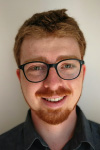
Dr. Valentin Walther, Fall 2023
Walther is an assistant professor of both Physical Chemistry and Physics and Astronomy. He uses his extensive knowledge of quantum physics to teach advanced Quantum Mechanics and Quantum Optics, graduate level courses, at Purdue University.
“My research focuses on the science of light, called quantum optics,” explains Walther. “A long-term dream is to manipulate individual particles of light or photons. To make this happen, we investigate how we can interface light in novel ways with atoms and semiconductors. We devise schemes for how we can create correlations between photons and how photons form quantum mechanical superposition states with atoms and semiconductor excitations, called polaritons. We also develop theoretical tools to describe the interaction of light and matter on the level of a few and many photons, and what we can learn about matter when we look at light that it emits.”
Walther is originally from central Germany. He completed his BS in Frankfurt, Germany before moving to Stony Brook University for a year on a Fulbright grant. He received his PhD in theoretical physics at the Max-Planck-Institute for the Physics of Complex Systems in Dresden and also the University of Aarhus, Denmark. He then spent three years as a postdoctoral fellow at the Institute for Theoretical Atomic, Molecular and Optical Physics (ITAMP) at Harvard University. He says that his new home at the Purdue University West Lafayette campus stands out as the first smaller-town or rural environment he has lived in.
“I'm excited about the vibrant research in quantum science at Purdue,” he says. “I really like the strong collaborative atmosphere among senior colleagues and the many starting research groups. The active participation of faculty and graduate students at the AMO seminars is a great example of this. My work is in AMO Theory, which is a traditional physics domain but it has more recently developed exciting overlap with Chemistry. I collaborate with chemistry colleagues on organic molecules that emit light, on semiconductors and giant Rydberg molecules.”
When he’s not teaching or conducting research, he enjoys the great outdoors. “I love being outdoors and I can be seen riding my bike to campus, almost every day. I've already explored some of the local places to hike but am currently expanding my horizon,” he says.
Walther welcomes students, graduate and undergraduate, to reach out to him by email and join his weekly group meetings. They can learn more about him at his research website.
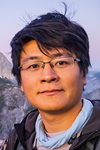
Dr. Tiancong Zhu, Spring 2024
Zhu is an assistant professor and began setting up his research program in the 2024 spring semester. He brings with him expertise in condensed matter physics and materials science, where he designs 2D quantum materials and heterostructures with novel properties and investigates their underlying physics at the atomic scale. He also explores the applications of these materials for both spintronics and quantum information science. He is currently setting up his lab in the Birck Nanotechnology Center with a state-of-the-art scanning tunneling microscope and a molecular beam epitaxy system. He is also setting up another lab in the physics building for van der Waals material assembly, hoping to provide more research opportunities to undergraduate students. In addition, he plans to develop a class on scanning probe microscopy and thin film deposition in the future to share his knowledge to the students who are interested in these topics.
“I am thrilled to join the Department of Physics and Astronomy at Purdue University, eager to embark on this new venture in physics,” says Zhu. “I look forward to collaborating with exceptional colleagues and inspiring students, exploring new frontiers in physics during this exciting quantum era.”
Zhu is an experimentalist who designs and investigate new materials with state-of-the-art technologies at atomic precision.
“My research delves into understanding how electrons behave within the atomic lattice of materials, and how that leads to intriguing quantum phenomena like magnetism, topological properties, and superconductivity,” explains Zhu. “I meticulously design new materials with atomic precision using molecular beam epitaxy and van der Waals stacking. Employing scanning tunneling microscopy, I explore the properties of materials at the atomic scale, hoping to bridge the gap between macroscopic quantum phenomena and microscopic intricacies and explore their usage in quantum technology and information science.”
Zhu is originally from Anhui, China. He earned his bachelor's degree in physics from Peking University in China. He spent six years in Columbus, OH, working on his Ph.D. at the Ohio State University. While there, he worked with Prof. Roland Kawakami, focusing on spin and magnetism in 2D materials. As a postdoctoral researcher at the University of California, Berkeley, he collaborated with Prof. Michael Crommie studying correlated and topological properties in 2D materials with scanning tunneling microscopy. He says the Midwest, including West Lafayette, feels like a second home.
“I love the people here, who are always warm-hearted and down-to-earth,” he says. “I was attracted to Purdue for its stellar academic reputation, highly collaborative research environment, and visionary approach to quantum materials and quantum information science. During my visit last year, I was impressed by the innovative research directions and ideas, vast research opportunities, and world-leading research facilities at both the Department of Physics and Astronomy and the Birck Nanotechnology Center. I feel that my expertise will fit very well with the existing research agenda at Purdue, and Purdue will also provide a perfect platform to advance my research goals.”
When not conducting research and teaching physics, Zhu can be found outside enjoying the great outdoors. He is an outdoor enthusiast and avid cyclist.
“Cycling, for me, is not just a sport but a way to enjoy nature and engage in conversations with friends,” he says. “During my postdoc at UC Berkeley, I organized cycling trips, forming lasting connections with lab mates and friends outside of work. I am hoping to establish something similar here at Purdue.”